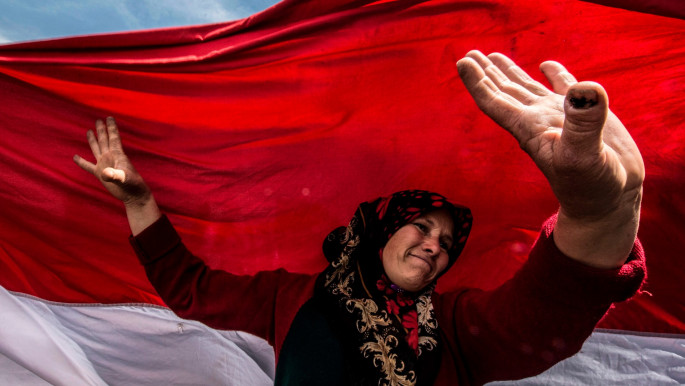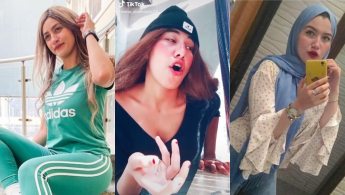How TikTok became Egypt's latest battleground against women
Just as those arrested before them, the public prosecution has charged the pair with "immoral practices", a vague term implying prostitution by way of the video platform.
However, a petition circulated by a group campaigning against what it calls a "systematic crackdown" against women influencers on the highly popular video platform reveal their real crimes may be as innocuous as posting selfies in fashionable clothes or taking part in the latest dance craze. In other words, normal teenage online behaviour.
The "immoral behaviour" charge has even been levelled against women using the site to make calls for help about a rape and blackmail ordeal, as in the case of Menna Abdul Aziz, who was arrested, detained, and charged after doing so in April.
Last Thursday's incident takes the tally of TikTok arrests to at least 12 in the past four months. Those facing punishment have several things in common: they are young, female, and from middle or lower-class backgrounds.
Justice for some women
As the campaign group has underscored, the crackdown comes at a watershed moment for combatting sexual assault in Egypt, making it not only a crackdown on women by the civilian and state moral policemen, but an open show of the prosecution's hypocrisy and a telling judgement on which women it feels it must police the most.
| Instagram Post |
In a landmark development for women's rights in Egypt, the public prosecution has taken action against alleged serial rapist and former American University in Cairo (AUC) student Ahmed Bassem Zaki. Zaki's arrest was prompted by a deluge of victim testimonies and evidence uploaded onto social media, with over 50 women accusing the 22-year-old of rape.
Known as the #ABZ case, the public prosecution took action based upon these allegations made over social media, not formal complaints lodged with the judicial body. The National Council for Women (NCW) - a nominally independent but state-aligned organisation - praised this action. The law was also changed to allow victims of sexual assault to remain anonymous. These were all highly commendable and long-awaited developments for many.
Zaki's status as the son of a telecoms mogul, who lives in a luxury compound and attended prestigious universities, bought him opportunities to prey on, assault and silence women. The victims were largely from these same wealthy circles.
Despite their huge popularity on the app, the TikTok girls lack the wealth or connections to influence Egypt's decision-making bodies.
Their videos are not like the highly polished and curated Instagram feeds of wealthy influencers, but fun and carefree content, singing along to popular songs against the backdrop of their more modest neighbourhoods.
The NCW has not yet come out to support them despite the viral social media campaigns in their defence.
Menna Abdul Aziz is just a teenager, while others, including Haneen Hossam who was arrested in April, are university students. Some wear the hijab, others choose to sport crop tops and ripped jeans. Mawada al-Adham and Manar Samy, arrested in May and June respectively, have budding careers as influencers across TikTok and other platforms.
 |
These women are not talking about politics, but what about if one day, one of them decides to use that platform? And then that's a threat |  |
Nearly all have been accused of trying to use the platform, albeit in "immoral" ways, to build a large following and make money.
Herein lies another of the regime's duplicities: it cracks down on women for allegedly earning money from social media, but increasingly cuts off this demographic from well-paid jobs, and sits by as living standards continue to decline. Meanwhile it jails women for prostitution for posting a selfie on social media, but supports a niqab ban at university.
Who gets to define family values?
Since its establishment in a clause of Egypt's 2018 Cybercrime Law, "Egyptian family values" has been a bone of contention with rights campaigners in the country, who argue that the term is left undefined and deliberately vague in order to adapt to the whims of the public prosecution.
Twitter Post
|
Article 25 of the law, which gives the state increased powers for online surveillance, blocking websites, and monitoring internet users, punishes anyone who attacks these unspecified values with six months in prison and/or a 50,000 EGP ($3,100) fine.
As the petition reads: "If Tik Tok women are being punished for their content that 'violates the Egyptian Family Values', could we at least know what [those values are]? Which family do we mean?"
The hashtag #بعد_اذن_الاسرة_المصرية - "if the Egyptian family allows" - has also been circulating social media, encouraging people to speak out against the hypocrisy of the law.
According to Egyptian journalist and researcher Nourhan Fahmy, the scope of cyber monitoring was further expanded in 2019 with the appointment of the new Public Prosecutor, Hamada al-Sawy, who established a new monitoring unit dedicated to social media.
"While this unit does have a positive impact in monitoring complaints like what happened recently with sexual predator Ahmed Bassam Zaki's case, there are countless other cases including journalists, human rights defenders and most recently, the TikTok girls, who have been targeted as well," Fahmy told The New Arab. "Therefore, there is an apparent expansion in the pool of suspects as a result of this increased social media monitoring."
How the TikTok case has played out also exhibits how this law works in the favour of men.
"Some citizens, who also happen to be males, [are willing] to act as 'guardians' of these purported societal values and go on to track and report women vloggers, or simply any woman or girl who broadcasts videos that they deem are inappropriate and file a complaint," said Fahmy. "The receiving end here, which is the prosecution, take such claims seriously and go on to investigate."
This is of course provides another jarring contrast with Menna Abdul Aziz reporting her ordeal on the site, while other alleged victims of harrowing assaults, including a group of women who took to social media in 2018 to accuse Egyptian footballer Amr Warda of rape and harassment, are also ignored.
Fahmy argues this unofficial cooperation between male civilians and the authorities to police women is a tool to optimise the control of female bodies and behaviour. This "reflects the conservative, patriarchal hegemony embodied in state laws and regularly reinforced by the state and its media," Fahmy added.
 |
They think the state has a role to manage morality. But the problem is what kind of morality? It depends on who you ask |  |
Egyptian activist Salma El Hosseiny agrees. "It really has to do with the fact that women's bodies are not theirs, they're always considered as their relation to their brother, their family, the state," she told The New Arab.
In the TikTok case, this effect is compounded by the fact that even if these women also complained themselves, the prosecution would never act on their accusations, however serious. These women's definition of the violation of "family values" does not matter.
"Just because someone files a complaint doesn't mean that the prosecution follows it up," said Hosseiny. "Victims of torture file complaints all the time and the prosecution never follows it up."
"Regardless of whether [these men] do this to rich women or not, the prosecution is also a patriarchal structure," says Hosseiny. "They think the state has a role to manage morality. But the problem is what kind of morality? It depends on who you ask. Some families would say FGM is part of Egyptian family values. The reason it got used against these women is because they have no one to back them up."
 |
|
| Read more: 'Educate, partner up!' Could Egypt's growing sexual harassment problem usher in a digital #MeToo? |
Why TikTok?
Moreover, this makes these women the first in the firing line on Egypt's ever-expanding demolition of civil society.
"They are the weakest in the ecosystem," said Hosseiny. "If their plan is to shut down TikTok, they'll start with those who they know neither society - that also has these prejudices - nor their parents, are influential and can defend them."
Fahmy called it a continuation of the crackdown on rights and freedoms that began in 2013, "first with the Muslim Brotherhood and their supporters, then expanded to encompass civil society more broadly to include journalists, lawyers, human rights defenders, political opposition and now, individuals, especially girls with a large following on social media."
Ironically, and tragically, this crackdown also demonstrates the potential these enterprising and popular women have, and why Egyptian patriarchal authorities consider them to be a threat.
"Everything is a threat to them," says Hosseiny. "These women are not talking about politics, but what about if one day, one of them decides to use that platform? And then that's a threat," she said, citing the example of Mohamed Aly and his videos that led to a rare outbreak of mass anti-government protests in 2019.
The same effect was witnessed during the 2011 uprisings, which were facilitated by the mass mobilising power of new social media platforms, empowering legions of young people from Egypt's working-class neighbourhoods to take to the streets in protest.
Egypt's campaign against civil society will no doubt continue, but the untapped potential of these young and resourceful women will remain, if for the mean time under the surface.
Florence Dixon is a journalist at The New Arab.
Follow her on Twitter: @flo_dix


![Minnesota Tim Walz is working to court Muslim voters. [Getty]](/sites/default/files/styles/image_684x385/public/2169747529.jpeg?h=a5f2f23a&itok=b63Wif2V)






